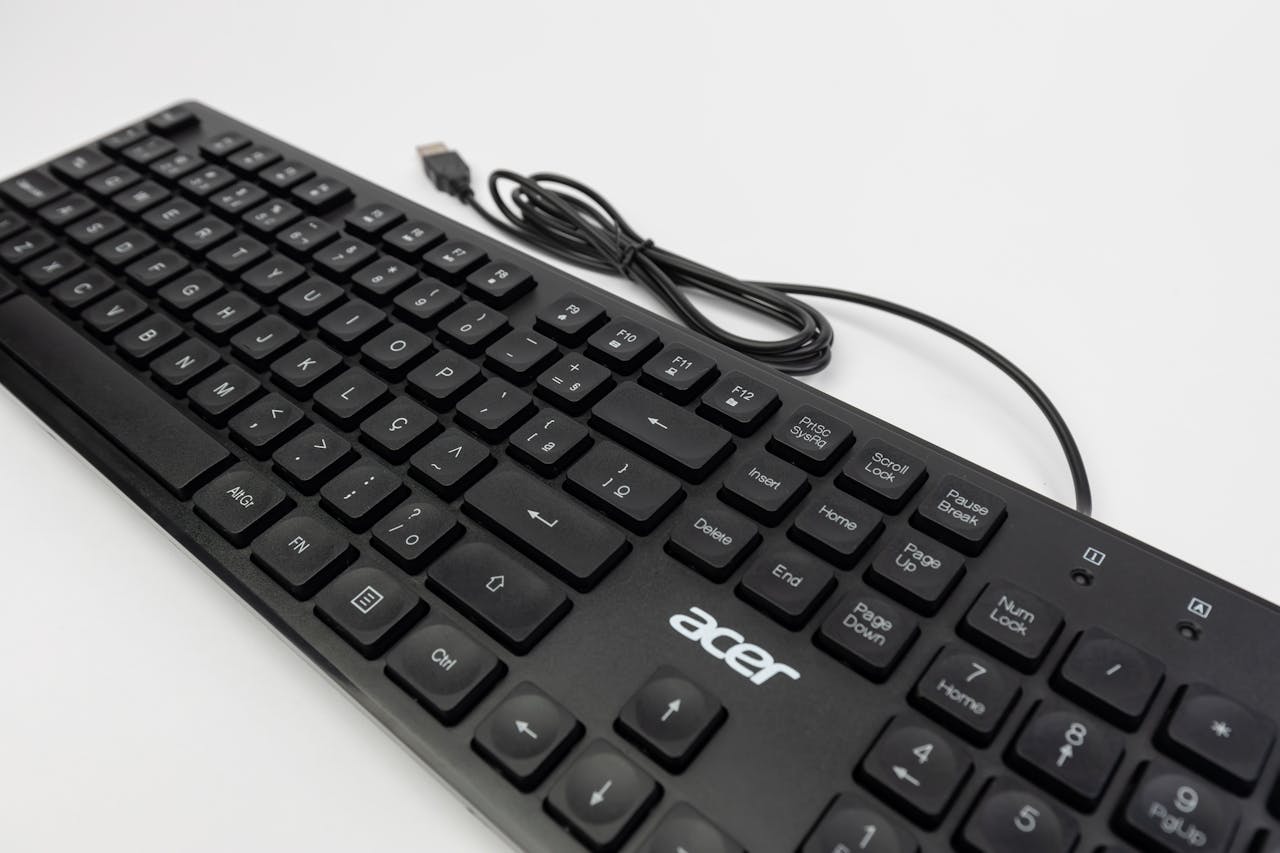Deciding Between Wired or Wireless Keyboards: Which Is Superior?

Choosing the right keyboard for your computer might seem simple, but it’s a decision that can greatly affect how you work or play. Keyboards come in two main types: wired and wireless.
Wired keyboards connect directly to your computer with a cable, known for faster reaction times which is perfect for gaming. On the other hand, wireless keyboards offer freedom of movement and a cleaner desk setup because they don’t need any wires.
This flexibility makes them an excellent choice for those who value convenience.
The differences between these keyboards go beyond just cables. They include how they connect to devices, their portability, response speed, potential interference from other devices, security issues, and compatibility with different systems.
People choose one over the other based on various factors like speed needs for gaming or the desire for a tidy workspace.
Many argue about which type of keyboard is superior without finding a clear winner. That’s because the best choice depends on what you find most important – whether it’s quick responses during intense gaming sessions or having a clutter-free desk space.
Keep reading to find out which keyboard fits your needs best.
Differences Between Wired and Wireless Keyboards
Wired keyboards connect through a physical cable, while wireless keyboards use radio frequency or Bluetooth technology for connection. Each type has its own unique advantages and drawbacks.
Connection type
Choosing between wired and wireless keyboards comes down to understanding their connection types. Wired keyboards connect directly to the computer via a USB port, providing a stable and quick response ideal for gaming and tasks requiring precision.
This direct line ensures that input lag is minimal, making them reliable for fast-paced action where every millisecond counts. On the other hand, wireless keyboards use Bluetooth or RF technology to connect, offering flexibility and a cleaner desk setup without cords.
The stability of the connection is what defines my choice in peripherals for high-stakes gaming sessions.
Wireless options have improved significantly, boasting strong connectivity that can rival wired devices under optimal conditions. Yet, they may face interference from other wireless signals nearby, slightly affecting performance.
The choice largely hinges on user preference for either mobility and convenience or unwavering reliability during critical computing activities.
Portability and mobility
Wired keyboards lack portability, as they require a physical connection to the computer. This limits their mobility and makes them less adaptable for different setups or work environments.
Conversely, wireless keyboards offer greater portability and freedom of movement due to their cordless nature. This allows users to easily switch between workstations or use the keyboard from a distance, providing more flexibility in working positions and layouts.
The adaptability of wireless keyboards contributes to enhanced mobility, making them a convenient choice for individuals who value portability in their input devices.
Input lag or latency rate
The input lag or latency rate significantly differs between wired and wireless keyboards. Wired keyboards generally have minimal input lag, making them ideal for gaming and high-speed typing tasks.
This low latency is due to the direct connection with the computer, resulting in swift and accurate response times. On the other hand, wireless keyboards may experience slightly higher input lag caused by the transmission of signals over Bluetooth or radio frequency.
Though this difference can be marginal, it may impact precision-demanding activities like gaming.
Moreover, when considering input lag or latency rate as a critical factor in keyboard selection, it’s essential to prioritize stability and reliable performance. In this regard, wired keyboards stand out for their consistent responsiveness without being affected by potential signal interferences that might impact wireless connectivity – a crucial aspect when engaging in competitive gaming or demanding professional applications.
Interference
Interference is a crucial consideration when choosing between wired and wireless keyboards. Wired keyboards are less susceptible to interference from other wireless signals, providing a more stable connection.
This stability can be attributed to the physical connection that eliminates the potential for signal disruptions, making wired keyboards an optimal choice in environments where interference may be a concern.
Wireless keyboards, on the other hand, may experience interference from other devices using similar frequencies, impacting their connection stability. It’s essential to weigh this factor when deciding between keyboard options and consider how much interference your workspace or gaming environment may have to ensure uninterrupted usage.
Security
Wired keyboards offer more security as they are less susceptible to hacking or unauthorized access compared to wireless keyboards. This is because the transmission of data through a wired connection is not vulnerable to interception by outside sources, enhancing the overall security of the keyboard.
Additionally, with wired keyboards, there is no risk of signal interception or eavesdropping, which can be a concern with wireless keyboards in certain settings.
Wireless keyboards may pose potential security risks due to their susceptibility to interception and hacking. The use of radio frequency signals for communication leaves them open to potential unauthorized access, making them less secure than their wired counterparts.
As a result, individuals handling sensitive information may opt for wired keyboards to minimize security risks associated with wireless technology.
Compatibility
Wired keyboards are compatible with most devices that have USB ports. Wireless keyboards, using Bluetooth technology, are compatible with a wide range of devices such as laptops, tablets, and smartphones.
However, some older devices may not support wireless connectivity.
The compatibility of both wired and wireless keyboards largely depends on the device or system they are connected to. It’s essential to ensure that the chosen keyboard is compatible with the specific device in question to avoid any connectivity issues or limitations.
Performance Comparison Between Wired and Wireless Keyboards
Wired keyboards offer faster speed and greater reliability compared to wireless keyboards. Additionally, they have a more consistent price range.
Speed
Wireless keyboards may have a slight delay in response time, affecting the speed of typing or gaming. This delay is due to the transmission of data over wireless connections, causing a minor lag compared to wired keyboards.
Wired keyboards offer faster speed and more immediate responsiveness due to the direct connection with the computer, enhancing user experience and efficiency when typing or gaming.
Ultimately, speed is a key factor to consider when deciding between wired and wireless keyboards as it directly impacts performance and user satisfaction. For individuals focused on quick and responsive input, especially for gaming or productivity tasks requiring swift keystrokes, the faster speed provided by wired keyboards could be a significant advantage worth considering.
Reliability
Wired keyboards offer superior reliability compared to wireless ones, as they provide a stable and constant connection without being affected by interference from other wireless devices.
This stability is crucial for ensuring uninterrupted performance during gaming or work tasks. Additionally, wired keyboards have a consistent power source through the physical connection, adding an extra layer of reliability.
Wireless keyboards rely on batteries or charging for power, which can affect their reliability as they may run out of power unexpectedly. Furthermore, they are susceptible to interference from other wireless signals, potentially leading to connectivity issues and interruptions during use.
Therefore, when considering keyboard options, it’s essential to prioritize reliability based on individual needs and usage purposes.
Price
Wired keyboards generally have a lower price compared to wireless ones. The absence of the need for batteries or complex wireless technology allows for a more affordable price point.
However, some high-end wired gaming keyboards with advanced features may come at a premium cost due to their specific functionalities and ergonomic designs. When considering the overall budget for peripheral devices, it is important to weigh the trade-offs between price and performance.
The decision on whether to choose a wired or wireless keyboard will involve not only the price but also other essential factors such as connectivity, portability, input lag, and personal preferences.
As we move forward in this comparison, let’s delve into the performance aspects of both types of keyboards.
Pros and Cons of Wired Keyboards
Wired keyboards offer a stable and reliable connection without the need for battery replacements, ensuring uninterrupted usage. For more insights on how wired keyboards can enhance your computing experience, continue reading our blog.
Advantages
Wired keyboards have a stable connection, ensuring uninterrupted usage. They do not require batteries, reducing maintenance requirements. Wired keyboards are usually more affordable than wireless ones due to their simpler technology and lack of additional components.
The stability of the wired connection ensures consistent performance, making them ideal for gaming and work that requires precision and reliability.
Wireless keyboards offer increased flexibility and mobility without the constraints of wires. They provide a clutter-free workspace, enhancing ergonomics and comfort during long hours of use.
Wireless keyboards also eliminate the hassle of cable management, offering greater freedom in positioning and adjusting devices for optimal comfort. Additionally, they contribute to a neater desktop setup or workstation with fewer cords to manage.
Next: Drawbacks
Drawbacks
Wired keyboards have limited mobility due to the cord, making them less convenient for users who frequently move their keyboard around. Additionally, the wires can create a cluttered workspace and may restrict movement during use.
The dependence on physical connections also means that wired keyboards are susceptible to damage if the cord is pulled or tripped over. This could lead to potential repairs or replacements, adding extra costs in the long run.
Wireless keyboards, however, require batteries or charging which can result in interruptions if not managed properly. Users may experience connectivity issues when the battery is low, impacting their workflow or gaming experience.
Furthermore, wireless keyboards are more prone to interference from other electronic devices in close proximity which could cause input lag and hinder performance. These drawbacks should be carefully considered before choosing between wired and wireless keyboards.
Pros and Cons of Wireless Keyboards
Pros of Wireless Keyboards:
Wireless keyboards offer enhanced flexibility and freedom due to their cordless design, allowing users to work or game from a distance. The absence of cables reduces clutter on the desk and provides a cleaner workspace.
Additionally, wireless keyboards are highly portable, enabling easy transportation for on-the-go use.
Cons of Wireless Keyboards:
One drawback of wireless keyboards is the need for battery replacement or recharging, which can be an inconvenience at times. Furthermore, interferences in signal transmission may occur in certain environments, leading to connectivity issues.
This can impact the keyboard’s responsiveness during crucial tasks or gaming sessions.
Which Keyboard is Right for You?
Which keyboard suits your needs best? Considerations will be made for gaming, personal preferences, budget, and device compatibility.
Considerations for gaming and work
When considering gaming, wired keyboards are preferred due to their faster reaction time and stable connection. This ensures seamless and uninterrupted gameplay, making them ideal for competitive gaming where split-second decisions matter.
On the other hand, wireless keyboards offer more flexibility and freedom of movement which can be advantageous in a work setting where mobility is key, allowing users to switch between devices seamlessly without being tethered to a specific location.
The choice between wired and wireless keyboards ultimately depends on the specific requirements of the user, whether it’s for intense gaming sessions or maximizing productivity at work.
Moving forward with “Personal preferences”.
Personal preferences
Consider your personal preferences when choosing between wired and wireless keyboards. Your specific needs, such as gaming or work requirements, will play a crucial role in making the right decision.
Additionally, budget and compatibility with your devices should also be taken into account before making a choice.
Budget
Let’s consider your budget when deciding between a wired or wireless keyboard. Wired keyboards generally cost less than wireless ones, making them a more budget-friendly option for many users.
Factors such as technology and accessories can also influence the price variation between corded and cordless keyboards. It’s important to keep these pricing differences in mind while making your decision on which type of keyboard best suits your needs.
Compatibility with devices
When deciding between a wired or wireless keyboard, it is essential to consider compatibility with your devices. Wired keyboards typically offer universal compatibility with most devices that have USB ports, ensuring ease of connectivity without the need for additional adapters.
On the other hand, wireless keyboards may require specific dongles or Bluetooth capabilities on your device for seamless connection, making compatibility more dependent on the technology within your computer or gaming system.
Considering the variety of options available and individual preferences in terms of device usage, understanding which type of keyboard aligns best with your devices is crucial in making an informed decision when choosing between wired and wireless keyboards.
Conclusion
Choosing between a wired and wireless keyboard often comes down to your needs, preferences, and budget. Each option has its unique advantages. Wired keyboards connect directly to the computer, offering fast response times and a stable connection – crucial for gamers who rely on speed.
They’re also typically more affordable than their wireless counterparts.
On the flip side, wireless keyboards provide flexibility and freedom of movement without the clutter of cables. This makes them ideal for those who prefer a clean workspace or need to work from various locations.
However, they can suffer from battery life issues and might experience interference from other devices.
For gaming purposes or tasks requiring quick inputs, wired keyboards are usually the better choice due to their reliability and lag-free performance. For general use where convenience and portability are key factors, a quality wireless keyboard could be superior as long as it meets your accuracy and reliability standards.
Remember that compatibility with your existing devices is another important factor in your decision-making process. Before making a purchase, ensure that the keyboard you choose works well with your computer’s operating system.
Ultimately, whether you opt for a wired or wireless keyboard should align with how you plan to use it most frequently—balancing factors such as performance requirements against personal preference for mobility or desk aesthetics.
FAQs
1. What’s the difference between wired and wireless keyboards?
Wired keyboards plug into your computer using a cord, while wireless keyboards connect through Bluetooth or a small USB receiver.
2. Are wired keyboards better for gaming?
Yes, many gamers prefer corded keyboards because they offer faster response times without lag.
3. Can I use a wireless keyboard with any computer?
Most computers support wireless keyboard connectivity, making it easy to use them with different devices.
4. Why might someone choose a wired keyboard over a wireless one?
Someone might pick a wired keyboard because they don’t need batteries and are reliable for constant use without worrying about losing connection.





